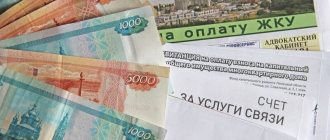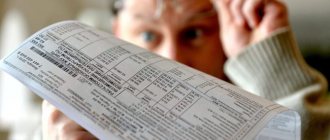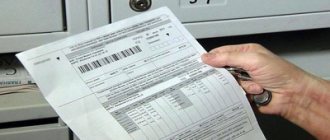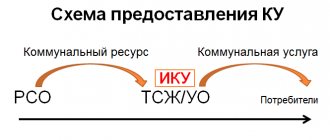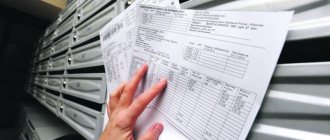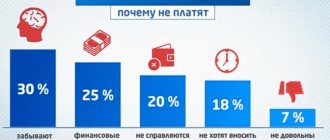They remembered their debt too late - the train left
Consumers have the right not to pay for housing and communal services if they demand a refund for a period of more than three years ago.
In civil law, this period is called the statute of limitations. But it must be taken into account that according to Part 1 of Art. 155 Housing Code of the Russian Federation and clause 2 of Art. 200 of the Civil Code of the Russian Federation “the limitation period for claims for collection of debt for payment of residential premises and utilities is calculated separately for each monthly payment.” This means that in each payment it is important to record the period for which payment for services is made.
If this is not done, then all the money subsequently received from you will, first of all, go to pay off the old debt, and then to offset current expenses.
Blog
Although Mr. Chibis constantly chirps that the population regularly pays for housing and communal services, there is a group of owners from whom it is almost impossible to collect the debt. Most often, these are marginal individuals who can only be submitted to the Cabinet of Curiosities, and even then they will not take them, since there are too many applicants for one place. The period of debt of such comrades is calculated in years, which means that there is a need to write off such debt in accounting with all the ensuing consequences. We'll talk about the consequences...
The Herods don’t pay... We are starting to write off the debt...
Accounting.
The debt of the owner of the premises to the management organization must be recognized as uncollectible and written off from the balance sheet in full, including VAT.
, if one of the following events occurred (clause 77 of the Order of the Ministry of Finance of Russia dated July 29, 1998 No. 34n “On approval of the Regulations on accounting and financial reporting in the Russian Federation” (hereinafter referred to as Regulation No. 34n):
- the statute of limitations has expired (in the case of debt for housing and communal services, it is three years);
- the debtor organization has been liquidated;
- the debtor organization is excluded from the Unified State Register of Legal Entities as an inactive legal entity;
- The bailiff issued a decision to terminate the enforcement proceedings and return the writ of execution to the recoverer due to the impossibility of collection.
Write-off of bad debts is documented with the following documents:
- settlement inventory act (INV-17). Please note that since 2013, this form is not mandatory for use
, so an organization can develop its own form of the act. - order from the head of the organization.
In the accounting records of the management organization, debt write-off is reflected in the following entries:
Dt 63 - Kt 62 (76)
Bad debt, against which a reserve for doubtful debts was created,
Dt 91 - Kt 62 (76)
Bad debt not covered by the reserve was written off
Dt 007
Bad debt is reflected in the off-balance sheet accounting of the management organization
The amount of debt written off for housing and communal services must be reflected in off-balance sheet account 007 within 5 years from the date of debt write-off
with the hope that the debtor will suddenly become a dollar millionaire and pay off the previously written off debt.
If a miracle does happen and the debtor pays the debt previously written off to an off-balance sheet account, the following entries are made in the accounting records of the management organization:
Dt 51 (50) - Kt 62 (76)
The receipt of money from the debtor is reflected
Dt 62 (76) - Kt 91
The repaid debt is taken into account in income (previously we put it as expenses)
Kt 007
A bad debt repaid by the debtor is written off
Tax accounting.
If everything is clear with the accounting of writing off bad debt amounts, then there are some peculiarities regarding the taxation of these amounts.
Income tax.
The criteria by which a debt is considered bad for income tax purposes are absolutely similar to the above criteria for writing off debt in accounting, so we will not dwell on them.
Please note that the debt of the owner of the premises cannot be considered a bad debt if this debt can be offset against the repayment of the management organization's counter-payables to the owner.
Amount of debt written off, including VAT:
- if the management organization has not previously created a reserve for doubtful debts for the purposes of calculating income tax, it is included in non-operating expenses on the basis of paragraph 2 of paragraph 2 of Article 265 of the Tax Code of the Russian Federation;
- if the management organization previously created a reserve for doubtful debts in tax accounting, the amount of debt written off is written off against the previously created reserve. If the amount of the formed reserve for doubtful debts is less than the amount of the bad debt being written off
, the amount of excess debt over the amount of the reserve is included in non-operating expenses on the basis of paragraph 2 of paragraph 2 of Article 265 of the Tax Code of the Russian Federation.
Simplified taxation system.
Start to be sad, but writing off bad debts is not reflected in any way when calculating the single tax under the simplified taxation system
(I would like it that way).
The reason is that, according to clause 1 of Article 364.17 of the Tax Code, the date of receipt of income for the purposes of calculating the simplified tax system is the day of receipt of funds in bank accounts and (or) at the cash desk (cash method). And since the money has not been received, it is quite logical that the list of expenses taken into account when calculating the simplified tax system and named in Article 346.16 of the Tax Code of the Russian Federation does not include expenses for writing off bad debts
.
This position, in particular, was expressed in the Letter of the Ministry of Finance of the Russian Federation dated February 20, 2021 N 03-11-06/2/9909.
Personal income tax.
Personal income tax and bad debts are made for each other. If you don't believe it, you'll get it...
From January 1, 2021, a new version of clause 1 of Article 223 of the Tax Code of the Russian Federation is in effect. Clause 5 has been added to this article, according to which the date of actual receipt of income
by an individual is defined, in particular,
as the day when a bad debt is written off in the prescribed manner from the organization’s balance sheet
. This position was expressed in particular in the Letter of the Ministry of Finance of Russia dated October 6, 2017 N 03-04-06/65512.
When writing off a bad debt of an individual, the management organization, on the basis of clause 1 of Article 24 and Article 226 of the Tax Code of the Russian Federation, is recognized as a tax agent and must fulfill the duties provided for tax agents by Articles 226 and 230 of the Tax Code of the Russian Federation, including the obligation no later than one month from the date the end of the tax period in which the relevant circumstances arose, notify the taxpayer and the tax authority at the place of registration in writing about the impossibility of withholding tax and the amount of tax
.
A form of information on the income of an individual “Certificate of Income of an Individual” (Form 2-NDFL), approved by Order of the Federal Tax Service of Russia dated October 30, 2015 N ММВ-7-11/ [email protected]
The tax office will send the citizen a tax notice about tax payment
. It must be paid no later than December 1 of the year following the year in which the individual received the income.
If the management organization does not send Form 2-NDFL to the tax authority in relation to each individual for whom receivables have been written off, it will be held liable
:
- organization (IP) in the amount of 200 rubles for each unsubmitted certificate
(clause 1 of Article 126 of the Tax Code of the Russian Federation); - the head of an organization in the amount of 300 to 500 rubles (note to Article 2.4, Part 1 of Article 15.6 of the Code of Administrative Offenses of the Russian Federation).
- You can discuss the article and ask questions here.
- The topic of debt forgiveness was discussed in detail at our webinar. More details at the link
Consumer deception - poor quality service
The money that utility companies receive from us monthly, as they say, is also money in Africa, in contrast to utility services, whose quality equivalent is unstable.
In this case, people follow three diametrically opposed paths: some continue to live, pay and hope that everything will get better over time, others get down to business and write complaints demanding to solve the problem and compensate for losses, others simply stop paying and fall into the category of debtors. Obviously, the most correct way is the second one. If you immediately contact the management company or homeowners association when a problem arises and draw up a report, you will have the right to recalculate for the period during which the interruptions occurred and the quality of the service suffered.
What should apartment owners do?
To avoid falling into debt, apartment owners should know what to do in a situation where it is not possible to pay utility bills in full.
A number of categories of citizens are entitled to preferential rates, including:
- disabled people;
- veterans;
- pensioners;
- large families;
- doctors or teachers whose place of work is in rural areas.
If you do not have an official job, it is also worth contacting social services with a request to apply for a subsidy.
Share This Post:
We don't need other people's debts
Often, when buying an apartment, people are faced with a situation in which they are informed of a debt for housing and communal services from the previous homeowners.
Utility providers and management companies are literally taking new residents by the throat, demanding that they pay “overdue payments.” In this case, always look at the claim date. New apartment owners must be responsible only for their utility debts from the moment of state registration of ownership of the property (clause 5, part 2, article 153 of the Housing Code of the Russian Federation, clause 1, article 131 of the Civil Code of the Russian Federation, article 210 of the Civil Code of the Russian Federation). For all previous periods of residence, debt collection for housing and communal services must be carried out from previous residents. An exception is the requirement to repay the debt of the previous owner to pay contributions for major repairs (Part 3 of Article 158 of the Housing Code of the Russian Federation).
When is a property owner disconnected from utilities?
If the resource supply company plans to suspend the supply of services, the property owner will be notified. Notification is given one month before service is discontinued. They have the right to turn off electricity and gas.
But if, after serving the notice, the owner begins to repay debts, they will not suspend the provision of services. If the owner ignores the notice and does not intend to make partial payments, the company notifies that it is sending a technician to suspend the service. This takes another 30 days. It turns out that to completely disable the service, the property owner has two months to begin fulfilling his obligations.
No one will turn off the heat and cold water. Suspending the provision of a service if there is a debt for another is also prohibited.
| Example Maxim has not paid his utility bills for two months. The management company sent a notice to turn off electricity if the owner does not begin to pay off debts on all utility bills. Maxim paid for electricity, water and gas, but the management company still turned off the electricity, because there were still debts for major repairs and maintenance of the property. Maxim went to court, which declared the actions of the management company illegal. And the management company resumed the supply of electricity only after the court decision. |
Debt in enforcement proceedings
It often happens that enforcement proceedings are terminated for the simple reason that there is nothing to take from the debtor, he does not have any property, and all measures to find such property did not bring results.
The bailiff will confirm the citizen’s lack of funds by issuing a resolution according to which debts for housing and communal services will also be written off, but until the debtor has property or funds that can be foreclosed on. Unlock access to the private part of Clerk with a Premium subscription. Get hundreds of webinars and online courses, unlimited consultations and other proprietary content for accountants.
Hurry up to subscribe with a 20% discount until October 15, 2021. Read more about “Premium” here.
Consequences of non-payment of utility debts
First of all, it is necessary to understand what threatens debtors who do not want to pay for services provided by public utilities.
Initially, the so-called “debt list” was practiced. Lists are posted at the entrance, indicating the name of the debtor and the amount of debt to the services. Utility workers rely on the sense of shame of homeowners, but in practice they don’t care about such lists.
The second step is to turn off the electricity, gas or water supply. However, apartment owners should be careful and know their rights.
The owner of an apartment or house has every right not to allow anyone into his home, therefore, if all the meters are located inside the apartment or on the territory of a private household, then representatives of the utility service do not have the right to turn off communications.
In order for you to be required to provide access to meters, representatives of utility services must provide you with a court order, but not all services decide to initiate legal proceedings.
Currently, in apartment buildings it is common practice to place meters on the staircase, and utility services may well suspend the supply of electricity.
Of course, if the debtor does not intend to pay the debt, then a penalty is also charged, which significantly increases the debt. And when the apartment is not privatized, there is even a risk of eviction. Of course, the debtor and his family members are not thrown out onto the street, but they are provided with housing no less in size in another part of the city.
Writing off utility debts is possible, but you should not believe all the advice offered on the Internet by pseudo-experts, since some of them are downright harmful and lead to negative consequences.
